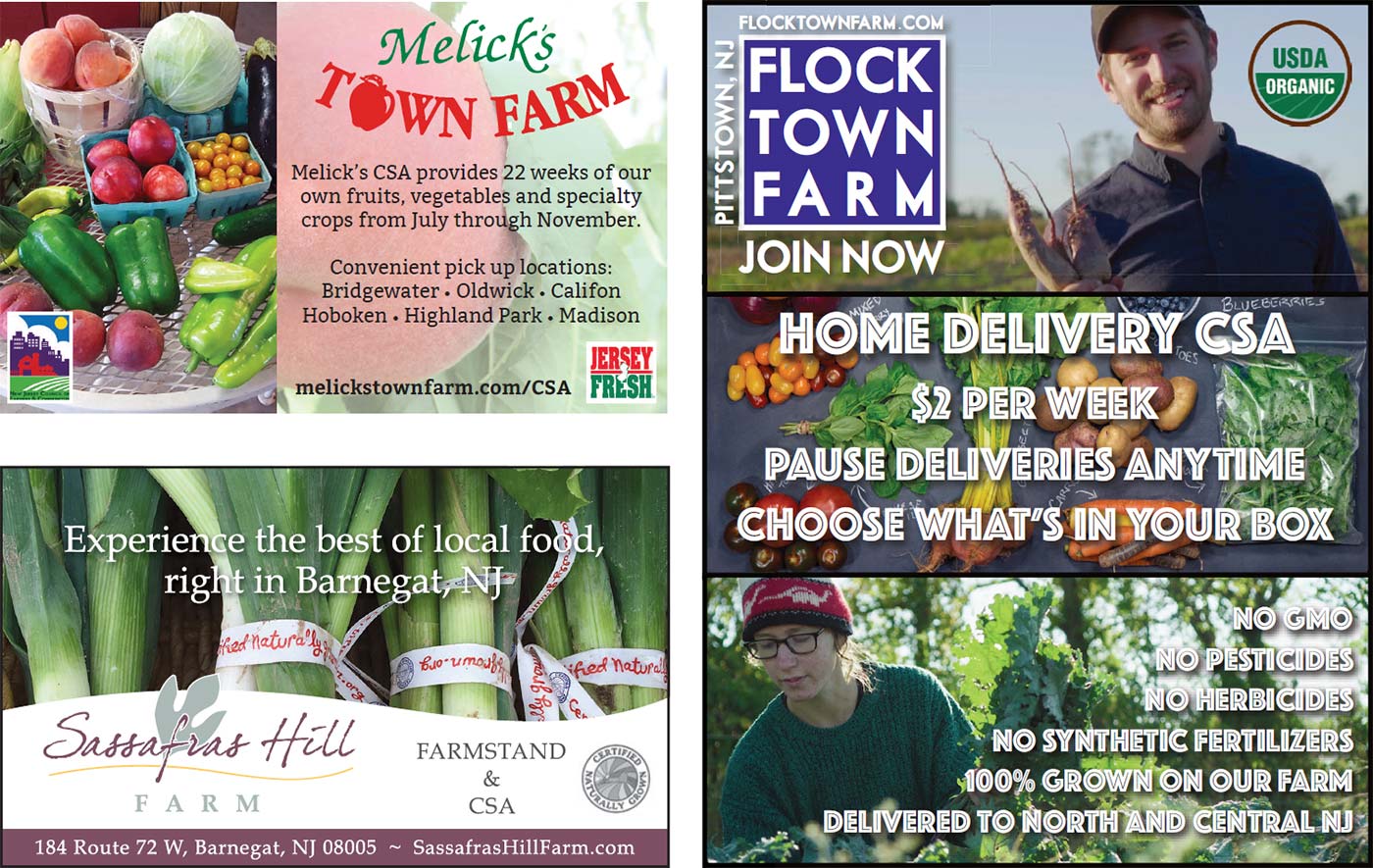The Benefits of CSA (Community Supported Agriculture)
CSA [community supported agriculture] represents a direct relationship between a community and its farmers. CSA programs help farms to be more financially sustainable while also providing consumers with access to fresh, healthy food. In CSA, members commit to financially support the farm before the growing season, either with the payment of a one-time membership fee or a series of installments. In return, farmers provide their CSA members with an abundance of Jersey Fresh products, usually in weekly boxes, during the harvest season. Many CSAs off er add-ons to their member boxes, such as fresh eggs or flowers. Successful CSAs are built on mutual trust: the farmer and the community agree to share the bounty as well as the risks, or losses, inherent in farming.
Most CSA harvest seasons and deliveries run May until November; sign-up takes place pre-season, usually January through April. It is estimated that more than 100 CSA programs are now available throughout New Jersey, and we present a few below and on the following page. Learn more at findjerseyfresh.com or ediblejersey.ediblecommunities.com/shop/csa-guide-jersey. Sign up for the 2020 CSA season and enjoy these benefits:
- Adapted from “8 Reasons to Join a CSA” by Sherry Dudas of Honey Brook Organic Farm (Edible Jersey Spring 2019). The farm’s CSA celebrates its 30th anniversary this year.
FRESH, NUTRITIOUS FARM FARE One of the primary motivations to become and remain a happy CSA member is the access to fresh, locally grown, nutritious food.
AFFORDABILITY A well-managed CSA can be an aff ordable way to provide fresh farm products for your household, as it represents a direct relationship between the farmer and members, without the added costs of middlemen.
HEALTHIER CHOICES Research has shown that CSA members increase their produce consumption, have a greater willingness to try unfamiliar produce and make other changes that increase their diet’s overall quality.
COMMUNITY CONNECTIONS For most CSA members, picking up their boxed shares requires a weekly or biweekly visit to the farm or pick-up site. On-farm visits are an opportunity for members to get to know each other as well as the farmers.
ALIGN FOOD CHOICES WITH VALUES AND DIETARY PREFERENCES There’s a CSA in New Jersey for nearly every diet. For vegetarians, there are farms offering vegetables, herbs, flowers and fruits exclusively as well as egg-only CSAs. If supporting a certifi ed organic produce or livestock farm is important to you, there are plenty of CSA options.
ETHNICALLY DIVERSE SELECTION New Jersey’s CSA members are ethnically diverse, so many CSA farmers actively seek crop recommendations from their members to expand the farm’s repertoire, sometimes even asking members to help them locate culturally appropriate seed sources.
DISTINCTIVE FOODS As CSAs respond to members’ desire for a more varied selection, a few have diversifi ed their product line to include native fruits such as persimmon and pawpaws and tropical spices turmeric and ginger; others off er grains, mushrooms and beans. Some CSA farmers process their farm bounty into added value products, such as salsas and sauerkraut, for distribution to members.
SHARE THE CHALLENGES OF CLIMATE CHANGE As the climate continues to change, New Jersey farmers will be challenged by longer growing seasons, warmer summers, milder winters, more frequent flooding and heavier rains, and unprecedented weather patterns and events. Farmers need time to develop the solutions to help them continue to farm responsibly, and CSA members’ financial and emotional support during periods of transition is their most meaningful and important contribution, now and in the years ahead.



- HONEYBROOK ORGANIC FARM
- honeybrookorganicfarm.com
- WALDEN LOCAL
waldenlocalmeat.com- ORT FARMS
ortfarms.com- B&B FARMS
facebook, twitter, instagram: @bbfarmsnj- MELICK'S TOWN FARM
melickstownfarm.com/CSA- FLOCK TOWN FARM
flocktownfarm.com- SASSAFRAS HILL FARM
sassafrashillfarm.com- VON THUN'S COUNTRY FARM MARKET
vonthunfarms.com




